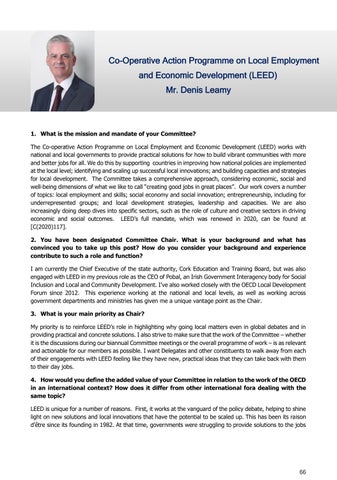Co-Operative Action Programme on Local Employment and Economic Development (LEED) Mr. Denis Leamy
1. What is the mission and mandate of your Committee? The Co-operative Action Programme on Local Employment and Economic Development (LEED) works with national and local governments to provide practical solutions for how to build vibrant communities with more and better jobs for all. We do this by supporting countries in improving how national policies are implemented at the local level; identifying and scaling up successful local innovations; and building capacities and strategies for local development. The Committee takes a comprehensive approach, considering economic, social and well-being dimensions of what we like to call “creating good jobs in great places”. Our work covers a number of topics: local employment and skills; social economy and social innovation; entrepreneurship, including for underrepresented groups; and local development strategies, leadership and capacities. We are also increasingly doing deep dives into specific sectors, such as the role of culture and creative sectors in driving economic and social outcomes. LEED’s full mandate, which was renewed in 2020, can be found at [C(2020)117]. 2. You have been designated Committee Chair. What is your background and what has convinced you to take up this post? How do you consider your background and experience contribute to such a role and function? I am currently the Chief Executive of the state authority, Cork Education and Training Board, but was also engaged with LEED in my previous role as the CEO of Pobal, an Irish Government Interagency body for Social Inclusion and Local and Community Development. I’ve also worked closely with the OECD Local Development Forum since 2012. This experience working at the national and local levels, as well as working across government departments and ministries has given me a unique vantage point as the Chair. 3. What is your main priority as Chair? My priority is to reinforce LEED’s role in highlighting why going local matters even in global debates and in providing practical and concrete solutions. I also strive to make sure that the work of the Committee – whether it is the discussions during our biannual Committee meetings or the overall programme of work – is as relevant and actionable for our members as possible. I want Delegates and other constituents to walk away from each of their engagements with LEED feeling like they have new, practical ideas that they can take back with them to their day jobs. 4. How would you define the added value of your Committee in relation to the work of the OECD in an international context? How does it differ from other international fora dealing with the same topic? LEED is unique for a number of reasons. First, it works at the vanguard of the policy debate, helping to shine light on new solutions and local innovations that have the potential to be scaled up. This has been its raison d'être since its founding in 1982. At that time, governments were struggling to provide solutions to the jobs
66
















